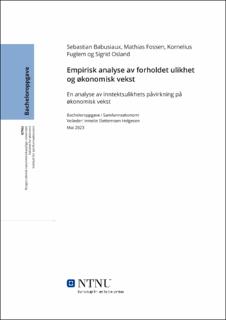| dc.contributor.advisor | Helgesen, Irmelin Slettemoen | |
| dc.contributor.author | Babusiaux, Sebastian | |
| dc.contributor.author | Fossen, Mathias | |
| dc.contributor.author | Fuglem, Kornelius | |
| dc.contributor.author | Osland, Sigrid | |
| dc.date.accessioned | 2023-06-28T17:20:10Z | |
| dc.date.available | 2023-06-28T17:20:10Z | |
| dc.date.issued | 2023 | |
| dc.identifier | no.ntnu:inspera:146681609:98282234 | |
| dc.identifier.uri | https://hdl.handle.net/11250/3074133 | |
| dc.description.abstract | Inntektsulikhet er en faktor som kan påvirke direkte økonomiske størrelser, som for eksempel
økonomisk vekst. Inntektsulikhets påvirkning på økonomisk vekst er uklar. Det finnes teorier
som forfekter en positiv påvirkning, og det finnes teorier som forfekter en negativ påvirkning.
Denne oppgaven analyserer forholdet mellom inntektsulikhet og økonomisk vekst, og skal
vurdere om det foreligger ulike sammenhenger for lavinntektsland og høyinntektsland.
Datasettet i oppgaven er hentet fra verdensbanken, og analysen anvender minste kvadraters
metode (OLS) som økonometrisk metode. Vi gjennomfører to ulike regresjonsanalyser, en for
lavinntektsland og en for høyinntektsland. I analysen benyttes det tidsseriedata fra 1960-2021
for de to utvalgene. Modellen legger til kontrollvariabler en etter en for å undersøke effekten
inntektsulikhet har på økonomisk vekst.
Resultatene fra analysen er tvetydig. For både lavinntektsland og høyinntektsland er funnene
statistisk signifikante, men inntektsulikhet synes å påvirke den økonomiske veksten ulikt. For
lavinntektsland viser resultatene en konkav sammenheng, mens for høyinntektsland er
sammenhengen konveks. Dette vil si at for lavinntektsland har inntektsulikhet en avtakende
positiv effekt på økonomisk vekst, fram til et toppunkt. Etter dette toppunktet vil
inntektsulikheten påvirke den økonomiske veksten negativt. Derimot tilsier resultatene for
høyinntektsland at inntektsulikhet har en avtakende negativ effekt på økonomisk vekst, frem
til et bunnpunkt. Etter dette punktet vil inntektsulikhet påvirke økonomisk vekst positivt. | |
| dc.description.abstract | Income inequality is a factor that can directly affect economic dimensions, for instance economic growth. The effect of income inequality on economic growth is unclear. There are theories that advocate that there is a positive relation between income inequality and economic growth, whilst other theories advocate that the relation is negative. This thesis analyses the relationship between income inequality and economic growth. We will further discuss whether there are different relations for low-income and high-income countries.
The dataset used in our thesis is gathered from the World Bank, and the analysis uses the method of ordinary least squares (OLS) as the econometric method. We implement two different regression analyses, one for low-income countries and one for high-income countries. In our analysis we use time-series data from 1960-2021. The model tallies the independent variables one after the other, in order to investigate the effect of income inequality on economic growth
The results of the analysis are ambiguous. The findings for both the low- and high-income countries are statistically significant, however income inequality affects economic growth differently. For the low-income countries our results show a concave relation, whilst the relation for the high-income countries is convex. This tells us that for low-income countries, income inequality has positive and diminishing effect on economic growth, up until the vertex. After the vertex, income inequality will have a negative effect on economic growth. Furthermore, the results for high-income countries indicate that income inequality has a negative and diminishing effect on economic growth, until the vertex. After the vertex, income inequality will have a positive effect on economic growth. | |
| dc.language | nob | |
| dc.publisher | NTNU | |
| dc.title | Empirisk analyse av forholdet ulikhet og økonomisk vekst | |
| dc.type | Bachelor thesis | |
